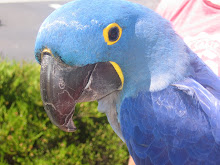Its hair felted and pillow-punk-styled
Fabric creases embossed on the side of its face
Eyes heavy-lidded, still sealed half-shut by sleep snot
Grunting, scratching, farting morning
Hacking its fetid, furry morning breath
They sit on opposite sides of the table
Light-years apart
"Well, aren't you just a thing of beauty," he snipes
And picks up the newspaper
Annoyed, she takes a huge gulp of coffee
It burns her tongue
Burns all the way down
Sears the pit of her stomach
He hides behind the paper
Propping it up so that she's able to read the other side
There is a picture of a sweet, elderly couple
Holding hands
Leaning against each other
Smiling proudly at the camera
To commemorate their fiftieth wedding anniversary
"My God!" she thinks, "Fifty Years!
Eighteen Thousand, Two Hundred And Sixty-Two Mornings!
And they haven't killed each other yet!"
"I'll never make it."


